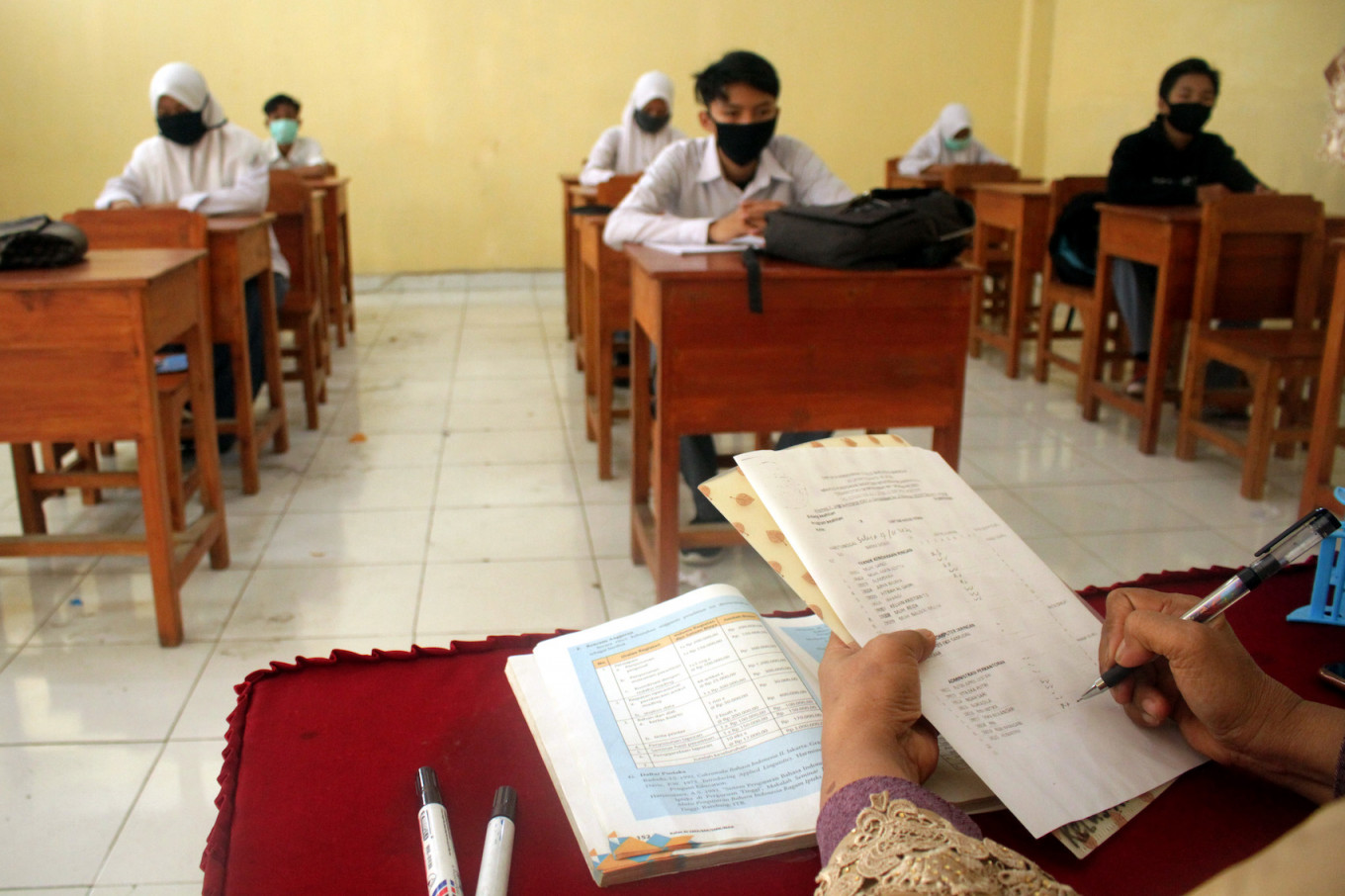Popular Reads
Top Results
Can't find what you're looking for?
View all search resultsPopular Reads
Top Results
Can't find what you're looking for?
View all search resultsSchool reopening raises question over safety procedures
Change text size
Gift Premium Articles
to Anyone
T
he government's decision to allow children to return to classrooms for the remainder of the 2020-2021 school year, or from January to July next year, has raised questions about schools' readiness to prevent further spread of the coronavirus.
Dewi Julia, the mother of a 15-year-old high school student in Jakarta, criticized how the government had rushed the decision without prior briefing of school administrations, teachers and parents.
Last week, the government gave the power to local administrations, school administrations and parents to decide whether their schools should reopen for in-classroom learning regardless of the risk level of COVID-19 infection in their region, including in high risk regions known as red zones. It is a major departure from the previous school reopening policy set out in June that allows only schools in regions with either low COVID-19 risk or no cases at all to reopen.
“We think it's too rushed. There should have been information for teachers, parents and students about the dos and don'ts in November, followed by a simulation and open discussion. But parents are still left in the dark," Dewi, a member of the Students' Parents Forum, said.
Despite remote learning being criticized for taking a mental health toll on both children and parents, particularly amid the absence of adequate teaching methods, she said children’s health was of utmost importance.
“We can always catch up on school courses and make up for lost time, but there is no tolerance for putting public health at risk,” she said.
Heru Purnomo, head of the Federation of Indonesian Teachers Associations (FSGI), said reopening schools could prevent a possible “lost generation” caused by poor quality of distance learning; but many schools were not fully ready to reopen.
The association visited a number of schools recently to see how feasible the government's decision was, and found that many schools had no procedures to ensure safety when children return to classrooms. Guidelines on how parents pick up and drop off their children, how students maintain safety and keep social distance while eating at school remain lacking.
“Face-to-face teaching that should not be at the expense of public health will largely depend on how school managements prepare infrastructure such as handwashing stations, hand sanitizer and other intangible sources like guidelines on how students should behave in school environments,” Heru said on Tuesday. “The readiness of parents and students also matters.”
Distance learning has yet to show major improvement for the past eight months, but Association for Education and Teachers (P2G) national coordinator Satriwan Salim said that in-classroom sessions might also be ineffective due to strict social restrictions.
“Classes will be divided into several sessions, school hours will be reduced, interactions between students will also be limited and there will be no extracurricular and sports activities. It could be more or less similar to remote learning,” he said in a written statement.
Satriwan said teachers should not be blamed or criminalized if students get infected by the coronavirus when they return to classrooms.
Afdhal, a teacher at a senior high school in East Java, said schools should be reopened only after COVID-19 vaccines were available and had been distributed across the country.
He cited P2G data that showed that many schools in 79 regions with zero cases and at low risk of COVID-19 infection had reopened prematurely in recent months, although the policy at the time did not allow them to do so without consent from local administrations and parents and health protocols in place.
“To date, we have yet to see any punishments handed down by the central government [against the 79 regions],” he said in a written statement.
Not long after Education and Culture Minister Nadiem Makarim announced the new policy last week, several regional leaders, such as East Java Governor Khofifah Indar Parawansa, were quick to consider the possibility of reopening schools next year, according to local media reports.
In worst-hit Jakarta, Governor Anies Baswedan said he would next month announce a decision regarding the future of in-classroom learning. “We will consult with health and education experts so that our decision is based on real conditions in Jakarta,” he said.
Heru of the FSGI said the central government could not just hand over the burden to local administrations.
“The roles of coordinating and policy-making lie in the hands of the central government. Regional administrations need supervision […] otherwise schools will become new COVID-19 clusters and then the government will blame the regional administrations,” Heru said.










